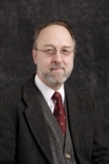 It has been said that the internet is the great equalizer. Anyone with a blog or webpage can be a self-appointed "expert" and publish to the world at will. That's not always a bad thing.
It has been said that the internet is the great equalizer. Anyone with a blog or webpage can be a self-appointed "expert" and publish to the world at will. That's not always a bad thing.
But those with real degrees, real theological training, and who have written real books (subject to peer review and hard-nose editors), look no different on your computer screen than someone who, as Dirty Harry once put it, "is a legend in their own mind."
While there are frauds in every discipline, now news comes that a Wikipedia "expert" on religion and theology is not a theologian with a Ph.D. (as claimed), but a twenty-something who lives in Kentucky and who has no advanced degrees and may have attended a community college for a semester or two. In fact, his "reference" for his articles on Romanism on the Wiki was Catholicism for Dummies.
According to an article on the Telegraph.UK (Click here: News | Telegraph) . . .
"Wikipedia, the online encyclopaedia, has been plunged into controversy after one of its most prolific contributors and editors, a professor of religion with advanced degrees in theology and canon law, was exposed as a 24-year-old community college drop-out. The editor, who called himself Essjay, was recruited by staff at Wikipedia to work on the site’s arbitration committee, a team of expert administrators charged with vetting content on the online `free encyclopaedia that anyone can edit'. But no-one apparently vetted the credentials of Essjay, who claimed to be a tenured professor of religion at a private university and contributed to an estimated 20,000 Wikipedia entries. In fact Essjay was actually Ryan Jordan, a 24-year-old from Kentucky with no advanced degrees who used texts such as Catholicism for Dummies to help him correct articles on the penitential rite or transubstantiation. He was unmasked after the New Yorker magazine ran a long feature on Wikipedia last summer that referred to Essjay’s contributions to the site and how he would spend up to 14 hours a day editing, `correcting errors and removing obscenities'. The piece described him as a `professor of religion with a PhD in theology and a degree in canon law' and noted he was serving his `second term as chair of the mediation committee' which rules on disputes over information posted on the site. But last week Essjay was forced to resign after a noted critic of the online encyclopaedia contacted the New Yorker and told the magazine his biographical information was fake. `He holds no advanced degrees,' the New Yorker stated in an editor’s note. `He has never taught.' The magazine added: `At the time of publication, neither we nor Wikipedia knew Essjay’s real name.' Essjay had told them he hid his identity because `he feared personal retribution from those he had ruled against online', the New Yorker said."
_____________________________
It goes to show that just because someone has a blog or a website, and passes themselves off as an "expert," it doesn't mean squat! You may be dealing with someone who has no education or knowledge, who is using second-rate sources or hearsay, and who may even be plagiarizing others (who may also be knuckleheads).
So, when it comes to the blogosphere and cyper-space, it is caveat emptor! Many with blogs, it seems, are suddenly "experts." Granted, some of the best blogs out there are run by laymen and women with no formal theological training. That's fine. My point is not to be an educational snob.
But always learn to check out both personal credentials and sources when reading blogs. Quoting what someone else said on a blog (who may not have a clue themselves) is not a very effective means of contributing something of value. Self-appointed experts may be doing nothing more than spreading gossip and falsehood--like the person who said that "Calvin never believed in justification sola fide" (and who shall forever go nameless to spare them the shame they deserve). Of course, they'd read it on someone else's blog and admitted to never having read Calvin themselves.
If something is not properly sourced and documented, then don't believe it until you check it out! You might be "learning" from someone who was "quoting" someone else who was "misquoting" Reformed Theology for Dummies.
 Tuesday, March 20, 2007 at 09:45AM
Tuesday, March 20, 2007 at 09:45AM  Who said that?
Who said that? Kim Riddlebarger
Kim Riddlebarger
 OK, I couldn't resist the temptation to post a MacArthur quote. The quote indicates how an otherwise careful biblical interpreter ends up with people having babies and revolting against Christ -- after the second coming and the end of the age (cf. Luke 20:34-36)! Dispensationalism made him do it! The quote is from Dr. MacArthur's "Jet Tour Through Revelation" (audio 1290)
OK, I couldn't resist the temptation to post a MacArthur quote. The quote indicates how an otherwise careful biblical interpreter ends up with people having babies and revolting against Christ -- after the second coming and the end of the age (cf. Luke 20:34-36)! Dispensationalism made him do it! The quote is from Dr. MacArthur's "Jet Tour Through Revelation" (audio 1290)









